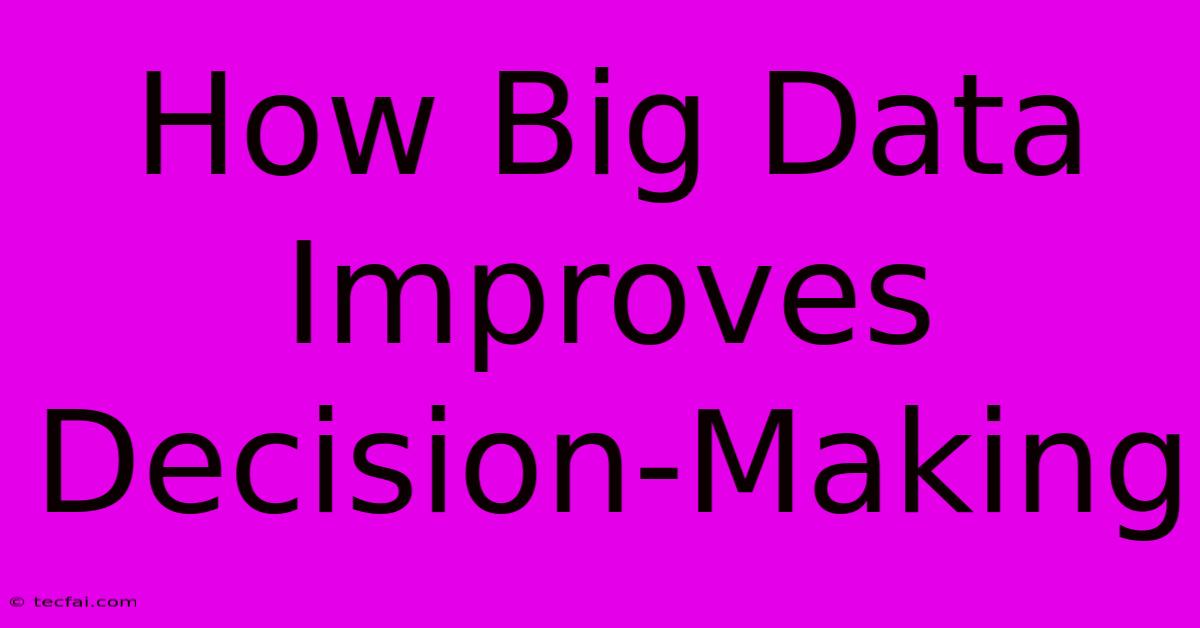How Big Data Improves Decision-Making

Discover more detailed and exciting information on our website. Click the link below to start your adventure: Visit Best Website tecfai.com. Don't miss out!
Table of Contents
How Big Data Improves Decision-Making
In today's rapidly evolving business landscape, data is no longer a mere byproduct of operations; it's the lifeblood of strategic decision-making. The sheer volume, velocity, and variety of data available—what we call big data—presents unprecedented opportunities for organizations to gain valuable insights and achieve a competitive edge. But how exactly does big data improve decision-making? Let's explore the multifaceted ways it transforms how businesses operate and strategize.
Understanding the Power of Big Data Analytics
Big data analytics involves the process of examining large and complex datasets to uncover hidden patterns, trends, and correlations. This goes far beyond traditional data analysis, leveraging sophisticated algorithms and technologies like machine learning to unearth insights that would be impossible to detect manually. The resulting intelligence allows businesses to make more informed, data-driven decisions, leading to improved outcomes across the board.
Key Benefits of Big Data in Decision-Making:
-
Enhanced Accuracy: Big data provides a broader, more comprehensive view than smaller, siloed datasets. This holistic perspective minimizes biases and inaccuracies often present in decisions based on limited information. The more data you have, the more accurate your predictions and analyses become.
-
Improved Forecasting: Predictive analytics, a cornerstone of big data analysis, leverages historical data and machine learning to forecast future trends. This allows businesses to anticipate market shifts, customer behavior changes, and potential risks, enabling proactive strategies rather than reactive ones. For example, predicting customer churn allows for timely intervention and retention strategies.
-
Better Resource Allocation: By analyzing operational data, businesses can optimize resource allocation. Big data can identify bottlenecks, inefficiencies, and areas for improvement, leading to cost savings and increased productivity. This could involve anything from optimizing supply chains to streamlining internal processes.
-
Personalized Customer Experiences: Analyzing customer data reveals individual preferences, behaviors, and needs. This granular understanding allows for personalized marketing campaigns, product recommendations, and customer service interactions, fostering stronger customer loyalty and higher conversion rates. Think targeted advertising or tailored product suggestions on e-commerce websites.
-
Reduced Risks: Big data analytics can identify potential risks and vulnerabilities before they escalate into major problems. This is particularly valuable in fields like fraud detection, risk management, and cybersecurity, where early identification is crucial for mitigation.
Big Data Tools and Technologies
Several technologies are crucial for harnessing the power of big data:
- Hadoop: A framework for storing and processing massive datasets across clusters of computers.
- Spark: A fast and general-purpose cluster computing system for big data processing.
- NoSQL Databases: Databases designed to handle large volumes of unstructured data.
- Cloud Computing: Provides the scalable infrastructure needed to store and process big data.
- Machine Learning Algorithms: Enable predictive modeling and pattern recognition within large datasets.
Challenges and Considerations
While big data offers immense potential, it's important to acknowledge the associated challenges:
- Data Security and Privacy: Protecting sensitive data is paramount. Robust security measures and compliance with data privacy regulations are essential.
- Data Integration and Management: Combining data from various sources can be complex. Effective data governance and management strategies are crucial.
- Skill Gap: Analyzing and interpreting big data requires specialized skills. Organizations need to invest in training and development to build internal expertise.
- Cost: Implementing big data solutions can be expensive, requiring investment in infrastructure, software, and personnel.
Conclusion: Embracing the Data-Driven Future
Big data is transforming decision-making across industries, offering unparalleled opportunities for growth and innovation. By embracing the power of big data analytics, organizations can make more informed, accurate, and timely decisions, leading to improved efficiency, reduced risks, and ultimately, a stronger competitive position. While challenges exist, the potential benefits far outweigh the hurdles, making the investment in big data analytics a crucial step towards a data-driven future.

Thank you for visiting our website wich cover about How Big Data Improves Decision-Making. We hope the information provided has been useful to you. Feel free to contact us if you have any questions or need further assistance. See you next time and dont miss to bookmark.
Featured Posts
-
Top Black Friday Deals Found
Nov 30, 2024
-
Gallants Wen Teen Super Sport Vermy Relegasie
Nov 30, 2024
-
5 Ways To Strengthen Supply Chains
Nov 30, 2024
-
Cerny On Rangers Europa League Future
Nov 30, 2024
-
Bob Bryar Mcr Drummer Dies At 44
Nov 30, 2024
